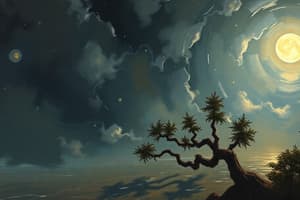Podcast
Questions and Answers
What is the process of natural selection?
What is the process of natural selection?
The process of natural selection is the driving force behind the development of new adaptive phenotypes in populations. It is based on the differential reproduction of organisms and the independent occurrence of elemental forces of evolution.
What is one factor that can lead to the formation of new species?
What is one factor that can lead to the formation of new species?
Geographical isolation is one factor that can lead to the formation of new species.
How does natural selection lead to the formation of a new species?
How does natural selection lead to the formation of a new species?
The process of natural selection can cause genetic divergence between populations, which then leads to reproductive isolation. When geographical isolation disappears, the process of natural selection can lead to the formation of a new species.
Flashcards are hidden until you start studying
Study Notes
- The process of natural selection drives the development of new adaptive phenotypes in populations.
- This process is based on the differential reproduction of organisms and the independent occurrence of elemental forces of evolution.
- Geographical isolation is one factor that can lead to the formation of new species.
- The process of natural selection can cause genetic divergence between populations, which then leads to reproductive isolation. When geographical isolation disappears, the process of natural selection can lead to the formation of a new species.
Studying That Suits You
Use AI to generate personalized quizzes and flashcards to suit your learning preferences.




